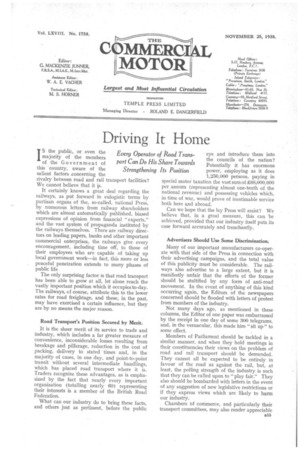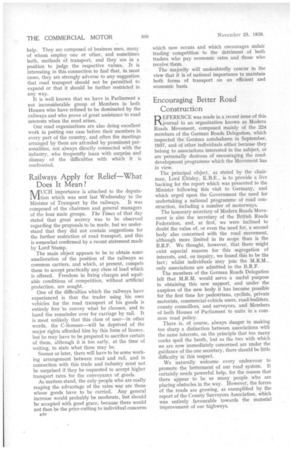Driving It Home
Page 25

Page 26

If you've noticed an error in this article please click here to report it so we can fix it.
the public, or even the majority of the members of the Government of this country, aware of the salient factors ,concerning the rivalry between road and rail transport facilities? We cannot believe that it is. It certainly knows a great deal regarding the railways, as put forward in eulogistic terms by partisan organs of the, so-called, national Press, by numerous letters from railway shareholders which are almost automatically published, biased expressions of opinion from financial "experts," and the vast system of propaganda instituted by the railways themselves. There are railway directors on leading papers, banks and other important commercial enterprises, the railways give every encouragement, including time off, to those of their employees who are capable of taking up local government work—in fact, this more or less peaceful penetration extends to many phases of public life The only surprising factor is that road transport has been able to grow at all, let alone reach the vastly important position which it occupies to-day. The railways, of course, attribute this to the lower rates for road freightage, and these, in the past, may have exercised a certain influence, but they are by no means the major reason.
Road Transport's Position Secured by Merit.
It is the sheer merit of its service to trade and industry, which includes a far greater measure of convenience, inconsiderable losses resulting from breakage and pilferage, reduction in the cost of packing, delivery to stated times and, in the majority of cases, in one day, and point-to-point transit without several intermediate handlings, which has placed road transport where it is. Traders recognize these advantages, as is emphasized by the fact that nearly every important organization (totalling nearly 60) representing their interests is a member of the British Road Federation.
What can our industry do to bring these facts, and others just as pertinent, before the public • eye and introduce them into the councils of the nation? Potentially it has enormous power, employing as it does 1,250,000 persons, paying in special motor taxation the vast sum of £88,000,000 per annum (representing almost one-tenth of the national revenue) and possessing vehicles which, in time of war, would prove of inestimable service both here a‘nd abroad.
Can we hope that the lay Press will assist? We believe that, in a great measure, this can 'be achieved, provided that our industry itself puts its case forward accurately and trenchantly.
Advertisers Should Use Some Discrimination.
Many of our important manufacturers co-oper ate with that side of the Press in connection with their advertising campaigns, and the total value of this publicity must be considerable. The railways also advertise to a large extent, but it is manifestly unfair that the efforts of the former should be stultified by any form of anti-road movement. In the event of anything of this kind occurring again, the Editors of the newspapers concerned should be flooded with letters of protest from members of the industry.
Not many days ago, as mentioned in these columns, the Editor of one paper was embarrassed by the receipt in one day of some 300 telegrams, and, in the vernacular, this made him "sit up" to some effect.
Members of Parliament should he tackled in a similar manner, and when they hold meetings in their constituencies their views on the problem of road and rail transport should be demanded. They cannot all be expected to be entirely in favour of the road as against the rail, but, at least, the polling strength of the industry is such that they can be called upon to "play fair." They also should be bombarded with letters in the event of any suggestion of new legislative restrictions or if they express views which are likely to harm our industry.
Chambers bf commerce, and particularly their transport committees, may also render appreciable sla help. They are composed of business men, many of whom employ one or other, and sometimes both, methods of transport, and they are in a position to judge the respective values. It is interesting in this connection to find that, in most cases, they are strongly adverse to any suggestion that road transport should not be permitted to expand or that it should be further restricted in any way.
It is well known that we have in Parliament a not inconsiderable group of Members in both Houses who have refused to be dominated by the railways and who prove of great assistance to road interests when the need arises.
Our road organizations are also doing excellent work in putting our case before their members in every part of the country, and often the meetings arranged by them are attended by prominent personalities, not always directly connected with the industry, who frequently learn with surprise and dismay of the difficulties with which it is confronted.
Railways Apply for Relief—What Does It Mean?
/[UCH importance is attached to the deputaMtion which was sent last Wednesday to the Minister of Transport by the railways. It was composed of the chairmen and general managers of the four main groups. The Times of that day stated that great secrecy was to be observed regarding the proposals to be made, but we understand that they did not contain suggestions for the further restriction of road transport, and this is somewhat confirmed by a recent statement made by Lord' Stamp.
The main object appears to be to obtain some amelioration of the position of the railways as common carriers, and which, at present, compels them to accept practically any class of load which is offered. Freedom in fixing charges and equitable conditions of competition, without artificial protection, are sought.
One of the difficulties which the railways have experienced is that the trader using his own vehicles for the road transport of his goods is entirely free 'to convey what he chooses, and to hand the remainder over for carriage by rail. It is most unlikely that this class of user—in other words, the C-licensee—will be deprived of the major rights afforded him by this form of licence, but he may have to be prepared to sacrifice certain of them, although it is too early, at the time of writing, to state what these may be.
Sooner or later, there will have to be some working arrangement between road and rail, and in connection with this trade and industry must not be surprised if they be requested to accept higher transport rates for the conveyance of goods.
As matters stand, the only people who are really reaping the advantage of the rates war are those whose goods have to be carried. Any general increase would probably be moderate, but should be accepted with good grace, because there would not then be the price-cutting to individual concerns which now occurs and which encourages unfair trading competition to the detriment of both traders who pay economic rates and those who receive them.
The majority will undoubtedly concur in the view that it is of national importance to maintain both forms of transport on an efficient and economic basis.
Encouraging Better Road Construction
REFERENCE was made in a recent issue of this journal to an organization known as Modern Roads Movement, composed mainly of the 224 members of the German Roads Delegation, which inspected the German autobahnen in September, 1937, and of other individuals either because they belong to associations interested in the subject, or are personally desirous of encouraging the roaddevelopment programme which the Movement has in view.
The principal object, as stated by the chairman, Lord Eltisley, K.B.E., is to provide a live backing for the report which was presented to the Minister following this visit to Germany, and which urged upon the Government the need for undertaking a national programme of road construction, including a number of motorways.
The honorary secretary of Modern Roads Movement is also the secretary of the British Roads Federation, and, at first, we were inclined to doubt the value of, or even the need for, a second body also concerned with the road movement, although more limited in its scope than is the B.R.F. We thought, however, that there might exist especial reasons for this segregation of interests, and, on inquiry, we found this to be the fact ; whilst individuals may join the M.R.M., only associations are admitted to the B.R.F.
The members of the German Roads Delegation felt that M.R.M. would serve a useful purpose in obtaining this new support, and under the auspices of the new body it has become possible for the first time for pedestrians, cyclists, private motorists, commercial-vehicle users, road-builders, county councillors, and surveyors, and Members of .both Houses of Parliament to unite in a corn mon road policy.
There is, of course, always danger in making too sharp a distinction between associations with the same interests, on the principle that too many cooks spoil the broth, but as the two with which we are now immediately concerned are under the guidance of the one secretary, there should be little difficulty in this respect. We naturally welcome every endeavour to promote the betterment of our road system. It certainly needs powerful help, for the reason that there appear to be so many people who are placing obstacles in the way. However, the forces of the roads are growing, as exemplified by the report of the County Surveyors Association, which was entirely favourable towards the material improvement of our highways.




















































































